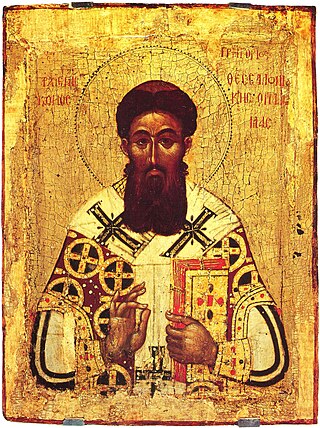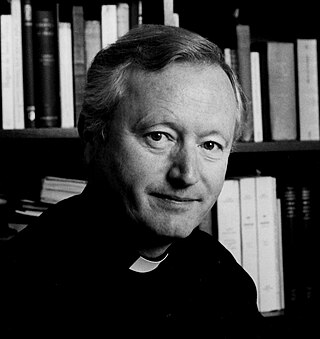Related Research Articles

Pseudo-Dionysius the Areopagite was a Greek author, Christian theologian and Neoplatonic philosopher of the late 5th to early 6th century, who wrote a set of works known as the Corpus Areopagiticum or Corpus Dionysiacum.

Proclus Lycius, called Proclus the Successor, was a Greek Neoplatonist philosopher, one of the last major classical philosophers of late antiquity. He set forth one of the most elaborate and fully developed systems of Neoplatonism and, through later interpreters and translators, exerted an influence on Byzantine philosophy, Early Islamic philosophy, Scholastic philosophy, and German Idealism, especially G.W.F. Hegel, who called Proclus's Platonic Theology "the true turning point or transition from ancient to modern times, from ancient philosophy to Christianity."

Apophatic theology, also known as negative theology, is a form of theological thinking and religious practice which attempts to approach God, the Divine, by negation, to speak only in terms of what may not be said about the perfect goodness that is God. It forms a pair together with cataphatic theology, which approaches God or the Divine by affirmations or positive statements about what God is.
John Scotus Eriugena, also known as Johannes Scotus Erigena, John the Scot, or John the Irish-born was an Irish Neoplatonist philosopher, theologian and poet of the Early Middle Ages. Bertrand Russell dubbed him "the most astonishing person of the ninth century". The Stanford Encyclopedia of Philosophy states that he "is the most significant Irish intellectual of the early monastic period. He is generally recognized to be both the outstanding philosopher of the Carolingian era and of the whole period of Latin philosophy stretching from Boethius to Anselm".

Eric Robertson Dodds was an Irish classical scholar. He was Regius Professor of Greek at the University of Oxford from 1936 to 1960.
Remigius (Remi) of Auxerre was a Benedictine monk during the Carolingian period, a teacher of Latin grammar, and a prolific author of commentaries on classical Greek and Latin texts. He is also accredited with collecting and compiling other early medieval thinkers' commentaries on these works.
Neoplatonism was a major influence on Christian theology throughout Late Antiquity and the Middle Ages in the East, and sometimes in the West as well. In the East, major Greek Fathers like Basil, Gregory of Nyssa and Gregory of Nazianzus were influenced by Platonism and Neoplatonism, but also Stoicism often leading towards asceticism and harsh treatment of the body, for example stylite asceticism. In the West, St. Augustine of Hippo was influenced by the early Neoplatonists Plotinus and Porphyry. Later on, in the East, the works of the Christian writer Pseudo-Dionysius the Areopagite, who was influenced by later Neoplatonists such as Proclus and Damascius, became a critical work on which Greek church fathers based their theology, like Maximus believing it was an original work of Dionysius the Areopagite.
William of Lucca was an Italian theologian and scholastic philosopher. He taught at Bologna, in the third quarter of the twelfth century.
Theodorus of Asine was a Neoplatonist philosopher, and a native of one of the towns which bore the name of Asine, probably Asine in Laconia.

The American Catholic Philosophical Quarterly is a peer-reviewed academic journal sponsored by the American Catholic Philosophical Association. It was founded in 1927 as The New Scholasticism and adopted its current title in 1990. The journal publishes articles and book reviews covering the entire range and history of Western philosophical thought. Contributions on non-Western philosophy are also published, especially if they shed light upon issues in the Western tradition. The journal is not committed to any particular school of philosophy and contributions variously employ analytical, phenomenological, Thomistic, historical, and other methods. Nevertheless, it typically prefers contributions on topics or thinkers that are of special interest to Catholic thought. Thus, almost every issue usually carries at least one article on Thomas Aquinas. Pieces on medieval thought are well represented as well, as are essays in the philosophy of religion and philosophical theology.
Dermot Moran is an Irish philosopher specialising in phenomenology and in medieval philosophy, and he is also active in the dialogue between analytic and continental philosophy. He is currently the inaugural holder of the Joseph Chair in Catholic Philosophy at Boston College. He is a member of the Royal Irish Academy and a founding editor of the International Journal of Philosophical Studies.

Medieval philosophy is the philosophy that existed through the Middle Ages, the period roughly extending from the fall of the Western Roman Empire in the 5th century until after the Renaissance in the 13th and 14th centuries. Medieval philosophy, understood as a project of independent philosophical inquiry, began in Baghdad, in the middle of the 8th century, and in France, in the itinerant court of Charlemagne, in the last quarter of the 8th century. It is defined partly by the process of rediscovering the ancient culture developed in Greece and Rome during the Classical period, and partly by the need to address theological problems and to integrate sacred doctrine with secular learning. This is one of the defining characteristics in this time period. Understanding God was the focal point of study of the philosophers at that time, Muslim and Christian alike.
Øystein Linnebo is a Norwegian philosopher. As of 2020 he is currently employed in the Department of Philosophy at the University of Oslo, having earlier held a position as Professor of Philosophy at Birkbeck College, University of London. He is a fellow of the Norwegian Academy of Science and Letters.
Mary Twibill Clark was an American Roman Catholic nun, academic, and civil rights advocate. She was best known as a scholar of the history of philosophy, and was associated especially with Saint Augustine.
Werner Beierwaltes was a German academic best known as a historian of philosophy. His most important areas of specialization were Neoplatonism and German Idealism. He was an Emeritus Professor of Philosophy at the Ludwig Maximilian University of Munich.
James Alexander Doull (1918–2001) was a Canadian philosopher and academic who was born and lived most of his life in Nova Scotia. His father was the politician, jurist, and historian John Doull.
Gorazd Kocijančič is a freelance Slovene philosopher, poet and translator. Kocijančič is well known for his translation of the entire corpus of Plato's work into Slovene.
Mary Louise Gill is the David Benedict Professor of Classics and Philosophy at Brown University. Her work primarily focuses on Plato, Aristotle, and other ancient philosophers.

Ilaria L. E. Ramelli is an Italian-born historian, academic author, and university professor who specializes in ancient, late antique, and early mediaeval philosophy and theology.

James J. McEvoy was an Irish philosopher and priest. His principal academic interests were related to medieval philosophy, particularly the work of John Scotus Eriugena and Robert Grosseteste. He also wrote about the philosophy of friendship.